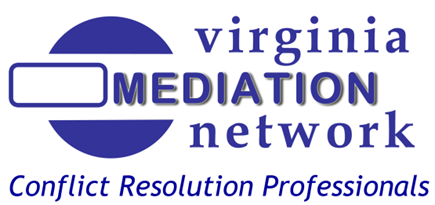Communication Theory: Implicit Communication of Emotions and Attitudes
Communication theories inform mediators by providing frameworks to understand, interpret, and facilitate constructive dialogue during conflicts. This interactive webinar focuses on the implicit communication of emotions and attitudes in order to identify potential misinterpretations and provide a supportive climate for problem-solving.
**Approved for 2.0 hours of CME credit (0.0 ethics) by the Supreme Court of Virginia**
VMN Members $20
Non-members $50
VMN Student Member $5
Non-member Students $15
*Please Note: This webinar will not be recorded or available for later viewing. Attendance is limited to the live session, so participants must join on the scheduled date to take part.
Presenter Bio: Karen Asaro
Karen Asaro’s ADR experience includes working with city government to design and implement a workplace mediation program. She has provided workshops for non-profit agencies and private businesses on topics including team-building, interpersonal communication, goal-setting, organizational restructuring, strategic planning and managing workforce diversity. Karen served as an ADR Advisor for FEMA for 10 years. Prior to Karen’s work with FEMA, she managed a mediation program for the City of Virginia Beach, overseeing court referred family mediation cases and workplace mediation for Human Resources.
Karen served for 10 years as an adjunct professor at Christopher Newport University teaching basic and family mediation courses.
Karen has facilitated consensus building processes related to land use issues, dialogues on race relations, and citizen complaints against local law enforcement. Karen serves on a number of dispute resolution panels including Ombuds services with the McCammon Group, the United States Postal Service Redress Program, Keybridge Foundation ADA Mediation Program, Virginia Department of Education Special Education Mediation Program and Virginia State Bar Fee Dispute Resolution Program.
Over the years, Karen's expert facilitation, mediation and training in conflict resolution has been recognized by various organizations including appointment by the Governor of Virginia to serve on the Interagency Dispute Resolution Advisory Council; U.S. Department of Justice Excellence in Prevention award for a high school peer mediation program; Virginia Beach City Manager's Award for excellence in creativity, innovation and public service; Virginia Beach Human Rights Commission Award for Support of Human Rights Programs in the Community; "Distinguished Service Award" , Virginia Supreme Court; FEMA’s Chief Counsel Award for Accessibility and Client Services; Virginia Mediation Network’s “Distinguished Mediator of the Year” award.
